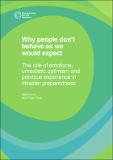| dc.contributor.author | Harris, Katie | |
| dc.date.accessioned | 2013-03-22T11:39:15Z | |
| dc.date.available | 2013-03-22T11:39:15Z | |
| dc.date.issued | 2012 | |
| dc.identifier.citation | Harris, K. (2012) Why People Don't Behave As We Would Expect. The Role of Emotions, Unrealistic Optimism and Previous Experience in Disaster Preparedness, SCR Think Piece, Brighton: IDS | en_GB |
| dc.identifier.uri | https://opendocs.ids.ac.uk/opendocs/handle/20.500.12413/2518 | |
| dc.description.abstract | Focusing on contributions from social psychology to better understand what motivates, influences or steers the behaviour of individuals, this paper seeks to introduce disaster risk managers to new concepts that they may not have otherwise come across. Structured around the themes of emotions, unrealistic optimism and previous experience, the concepts introduced in the paper include territorial functioning, unrealistic optimism, memory bias, evaluability and risk compensation. The paper includes a consideration of some of the methodological limitations of the research presented under these three themes, the implications for DRM, and conclusions, which point towards the need for a greater consideration of the role of culture in DRM. | en_GB |
| dc.language.iso | en | en_GB |
| dc.publisher | IDS | en_GB |
| dc.relation.ispartofseries | Strengthening Climate Resilience; | |
| dc.rights.uri | http://www.ids.ac.uk/files/dmfile/IDSOpenDocsStandardTermsOfUse.pdf | en_GB |
| dc.subject | Climate Change | en_GB |
| dc.title | Why People Don't Behave As We Would Expect. The Role of Emotions, Unrealistic Optimism and Previous Experience in Disaster Preparedness | en_GB |
| dc.type | Series paper (IDS) | en_GB |
| dc.identifier.externaluri | http://www.ids.ac.uk/idspublication/why-people-don-t-behave-as-we-would-expect-the-role-of-emotions-unrealistic-optimism-and-previous-experience-in-disaster-preparedness | en_GB |
| dc.identifier.team | Climate Change | en_GB |

